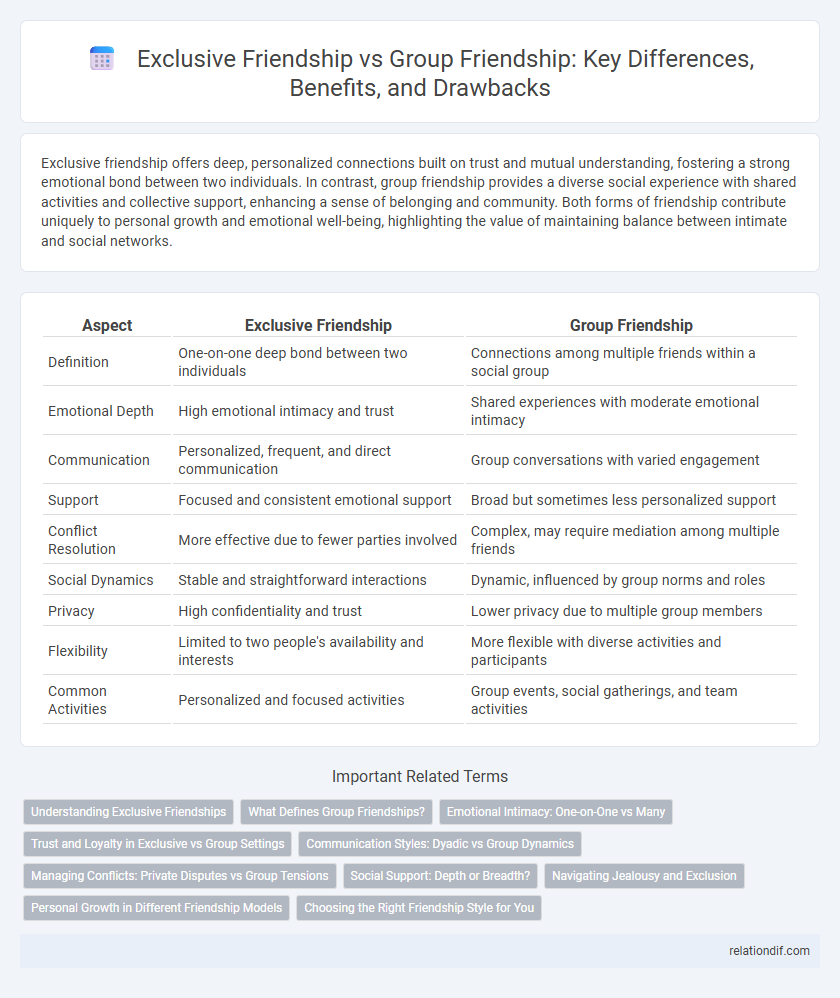Exclusive friendship offers deep, personalized connections built on trust and mutual understanding, fostering a strong emotional bond between two individuals. In contrast, group friendship provides a diverse social experience with shared activities and collective support, enhancing a sense of belonging and community. Both forms of friendship contribute uniquely to personal growth and emotional well-being, highlighting the value of maintaining balance between intimate and social networks.
Table of Comparison
| Aspect | Exclusive Friendship | Group Friendship |
|---|---|---|
| Definition | One-on-one deep bond between two individuals | Connections among multiple friends within a social group |
| Emotional Depth | High emotional intimacy and trust | Shared experiences with moderate emotional intimacy |
| Communication | Personalized, frequent, and direct communication | Group conversations with varied engagement |
| Support | Focused and consistent emotional support | Broad but sometimes less personalized support |
| Conflict Resolution | More effective due to fewer parties involved | Complex, may require mediation among multiple friends |
| Social Dynamics | Stable and straightforward interactions | Dynamic, influenced by group norms and roles |
| Privacy | High confidentiality and trust | Lower privacy due to multiple group members |
| Flexibility | Limited to two people's availability and interests | More flexible with diverse activities and participants |
| Common Activities | Personalized and focused activities | Group events, social gatherings, and team activities |
Understanding Exclusive Friendships
Exclusive friendships foster deeper emotional bonds by allowing individuals to invest more focused time and attention in one-on-one interactions. These relationships often provide a heightened sense of trust, intimacy, and personalized support compared to group friendships, which can dilute emotional connection across multiple members. Understanding exclusive friendships reveals how dedicated, concentrated interactions contribute to stronger empathy and mutual understanding between friends.
What Defines Group Friendships?
Group friendships are defined by shared experiences and collective interactions that foster a sense of belonging among multiple individuals. These connections often rely on common interests, mutual support, and social dynamics that encourage collaboration and group cohesion. The diversity within group friendships enhances communication skills and provides a broader emotional support network compared to exclusive one-on-one relationships.
Emotional Intimacy: One-on-One vs Many
Exclusive friendships foster deeper emotional intimacy through personalized attention and vulnerability, allowing for stronger trust and understanding between individuals. Group friendships, while providing social support and shared experiences, often distribute emotional connections among members, which can limit the depth of individual bonds. Prioritizing one-on-one interactions enhances emotional closeness, facilitating meaningful conversations and genuine empathy that are harder to achieve in larger social settings.
Trust and Loyalty in Exclusive vs Group Settings
Exclusive friendships foster deeper trust and loyalty through one-on-one emotional intimacy, allowing individuals to share vulnerabilities and build stronger bonds. In group friendships, trust is often distributed unevenly, as loyalty may shift among members depending on group dynamics and social roles. Exclusive settings prioritize personalized support, while group environments emphasize collective belonging but may dilute individual trust levels.
Communication Styles: Dyadic vs Group Dynamics
Exclusive friendships often feature dyadic communication characterized by deep, one-on-one conversations fostering intimacy and trust. In contrast, group friendships involve dynamic interactions where communication is more diverse, balancing multiple voices and social cues to maintain harmony. Dyadic exchanges enable personalized understanding, while group dynamics require adaptable communication skills to navigate collective preferences and conflicts.
Managing Conflicts: Private Disputes vs Group Tensions
Exclusive friendships often allow for more direct and personalized conflict resolution, enabling individuals to address disputes privately and with greater emotional nuance. In group friendships, managing tensions requires balancing multiple perspectives and maintaining group harmony, which can complicate communication and prolong conflicts. Effective conflict management in groups relies on fostering open dialogue and encouraging empathy to prevent misunderstandings from escalating.
Social Support: Depth or Breadth?
Exclusive friendship offers intense emotional intimacy and personalized social support, fostering deeper understanding and trust between individuals. Group friendship provides a broader network for diverse resources, varied perspectives, and a wider safety net during challenging times. Balancing depth in exclusive bonds with the breadth of group connections enhances overall social resilience and well-being.
Navigating Jealousy and Exclusion
Exclusive friendships often intensify feelings of jealousy and exclusion due to the deep emotional investment and limited social circle, making trust and open communication essential for maintaining balance. Group friendships, while offering broader social support, can also lead to subtle exclusion dynamics, requiring conscious efforts to ensure inclusivity and equal participation among members. Understanding the psychological impact of these social structures helps individuals navigate complex emotions linked to belonging and acceptance.
Personal Growth in Different Friendship Models
Exclusive friendships foster deep emotional support and personalized growth, enabling individuals to explore vulnerabilities and receive tailored feedback. Group friendships encourage diverse perspectives and social skills development, promoting adaptability and broad social learning. Both models contribute uniquely to personal growth by balancing intimacy with varied social experiences.
Choosing the Right Friendship Style for You
Selecting between exclusive friendship and group friendship depends on personal social needs and emotional preferences. Exclusive friendships offer deep, one-on-one connections fostering trust and support, while group friendships provide diverse interactions and a sense of community. Understanding your communication style and lifestyle is key to choosing the friendship style that best enhances your social well-being.
exclusive friendship vs group friendship Infographic

 relationdif.com
relationdif.com